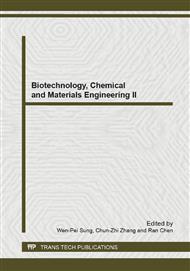[1]
Kamanagar F, Dores GM, Anderon WF. Patterns of cancer incidence, mortality, and prevalence across five continents: defining priorities to reduce cancer disparities in different geographic regions of the world. J Clin Oncol. 2006, 24: 2137-2150.
DOI: 10.1200/jco.2005.05.2308
Google Scholar
[2]
Lentini, Vincenzo, Cellini, et al. Radiotherapy in gastric cancer: a systematic review of literature and new perspectives. Expert Review of Anticancer Therapy, 2007, 7: 1379-93.
DOI: 10.1586/14737140.7.10.1379
Google Scholar
[3]
Zhenggang Zhu. The related problem of recurrence of gastric cancer and comprehensive treatment. Chinese Journal of Practical Surgery, 2005, 25: 181-183.
Google Scholar
[4]
Macdonald JS, Smalley SR, Benedetti J, et al. Chemoradiotherapy after surgery compared with surgery alone for adenocarcinoma of the stomach or gastroesophageal junction. N Engl J Med, 2001, 345: 725.
DOI: 10.1056/nejmoa010187
Google Scholar
[5]
Kim S, Lim DH, Lee J, et al. An observational study suggesting clinical benefit for adjuvant postoperative chemoradiation in a population of over 500 cases after gastric resection with D2 nodal dissection for adenocarcinoma of the stomach. Int J Radiat Oncol Biol Phys, 2005, 63: 1279-1285.
DOI: 10.1016/j.ijrobp.2005.05.005
Google Scholar
[6]
Kunisaki C, Makino H, Takagawa R, et al. Tumor diameter as a prognostic factor in patients with gastric cancer. Ann Surg Oncol, 2008, 15: 1959-(1967).
DOI: 10.1245/s10434-008-9884-3
Google Scholar
[7]
Shiraishi N, Sato K, Yasuda K, et al. Multivariate prognostic study on large gastric cancer. J Surg Oncol, 2007, 96: 14-18.
DOI: 10.1002/jso.20631
Google Scholar
[8]
Abe N, Watanabe T, Sugiyama M, et al. Endoscopic treatment or surgery for undifferentiated early gastric cancer?Am J Surg, 2004, 188: 181-184.
DOI: 10.1016/j.amjsurg.2003.12.060
Google Scholar
[9]
Zhen You, Tong Liu, Huiqun Sun, et al. The analysis of lymph nodes metastasis and prognosis. Journal of Mudanjiang, 2008, 29: 9-11.
Google Scholar
[10]
Cheong O, Oh ST, Kim BS, et al. Large Metastatic Lymph Node Size, Especially More Than 2 cm: Independent Predictor of Poor Prognosis in Node-Positive Gastric Carcinoma. World J Surg, 2008, 32: 262-266.
DOI: 10.1007/s00268-007-9158-4
Google Scholar
[11]
Y Nakamura, H Yasuoka, M Tsujimoto, et al. Importance of lymph vessels in gastric cancer: a prognostic indicator in general and a predictor for lymph node metastasis in early stage cancer. J Clin Pathol, 2006, 59: 77-82.
DOI: 10.1136/jcp.2005.028779
Google Scholar
[12]
Bryan JD, Kathryn G, Stewart MH, et al. Lymphovascular Invasion Is Associated With Poor Survival in Gastric Cancer. Ann Surg, 2006, 243: 64-73.
Google Scholar
[13]
Kikuchi Y, Tsuchiya A, Ando Y, et al. Immunohistochemical detection of lymph node microinvolvement in node-negative gastric cancer. Gastric Cancer, 1999, 2: 173–178.
DOI: 10.1007/s101200050042
Google Scholar
[14]
Akihiro Sako, Joji Kitayama, Makoto Ishikawa, et al. Impact of immunohistochemically identified lymphatic invasion on nodal metastasis in early gastric cancer. Gastric Cancer, 2006, 9: 295–302.
DOI: 10.1007/s10120-006-0396-1
Google Scholar


